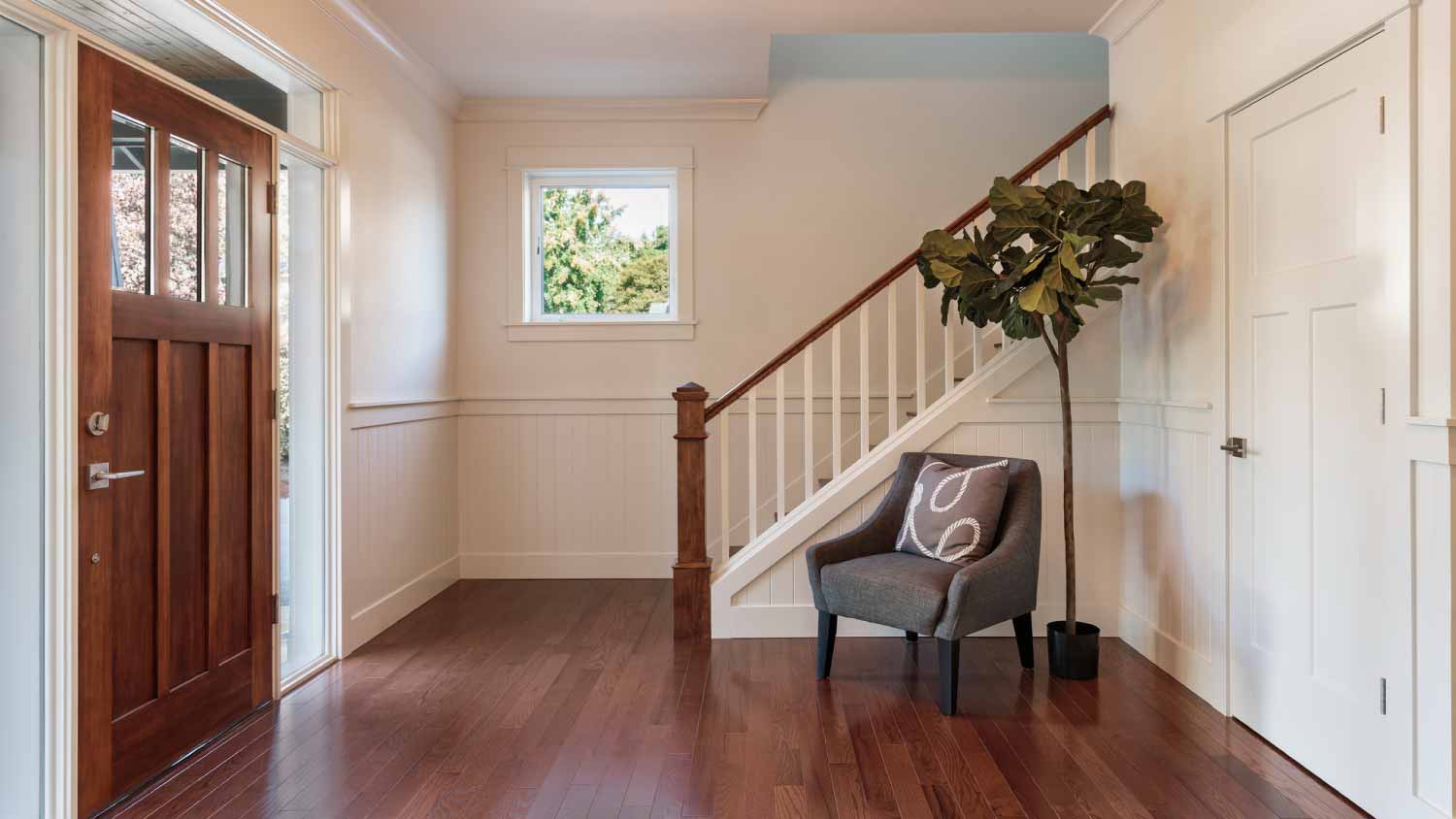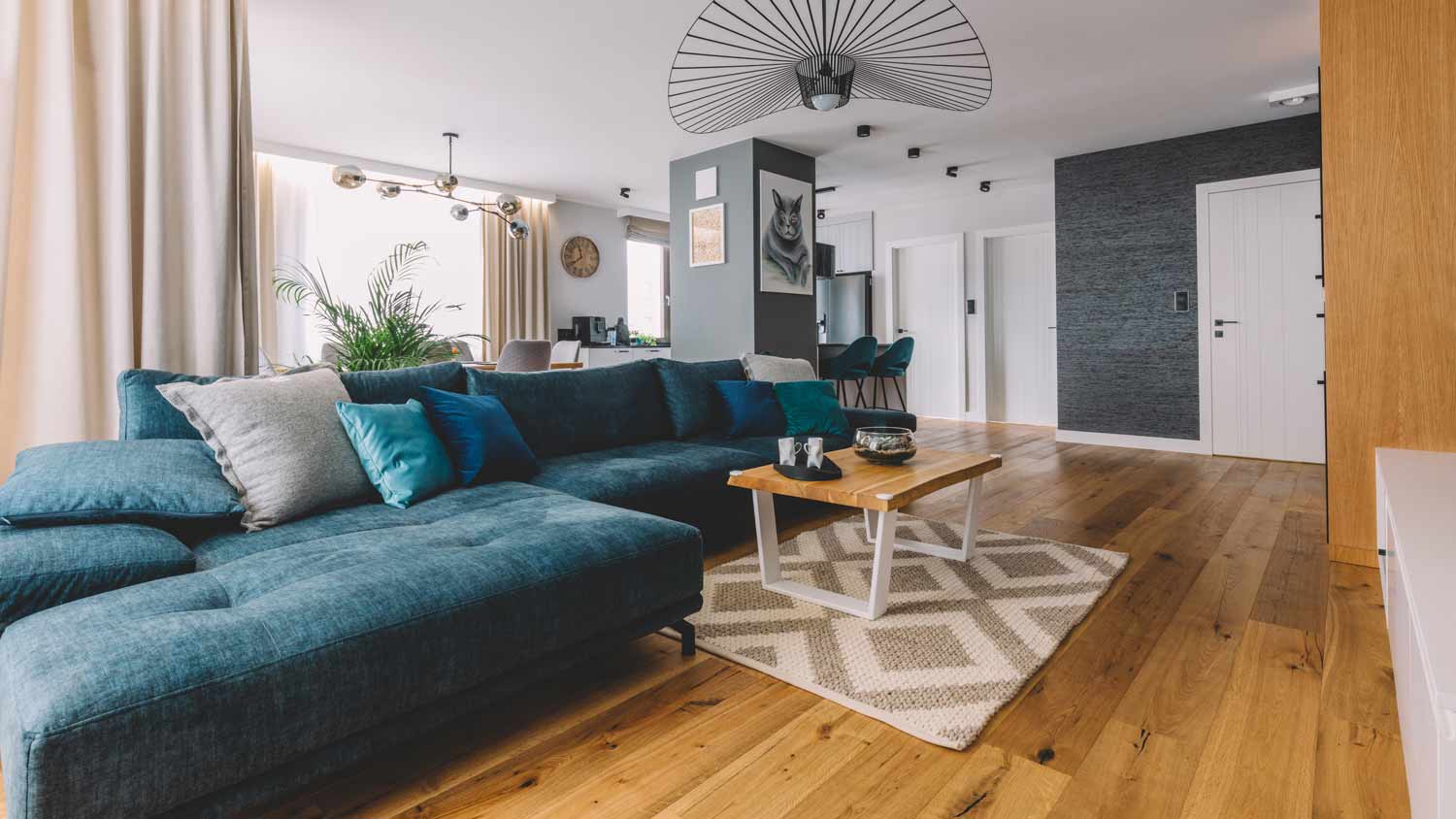How Much Does Bamboo Flooring Cost? [2025 Data]
Bamboo flooring costs $3,400 on average, depending on the quality and square footage. Most spend between $1,750 and $5,000.


On average, bamboo flooring costs $3,400. However, the price you pay can range from $1,750 to $5,000, depending on the type of bamboo you choose, the size of your space, and other factors. Below, we’ll break down the cost of bamboo flooring so you can make an informed decision based on your budget and needs.
Bamboo Flooring Cost Factors
Not all bamboo flooring is the same, and your project cost will vary based on size, flooring type, brand, and labor.
Size of Room
You can expect to pay $7 to $20 per square foot to cover materials and labor costs. The larger the floor space, the more materials and labor you’ll need. Multiply the square footage of the area you’d like to outfit to estimate the price you’ll pay.
| Room Size in Feet | Square Footage | Average Cost |
|---|---|---|
| 10x10 | 100 | $700–$2,000 |
| 10x12 | 120 | $840–$2,400 |
| 12x12 | 144 | $1,010–$2,880 |
| 12x14 | 168 | $1,180–$3,360 |
| 14x16 | 224 | $1,570–$4,480 |
| 16x16 | 256 | $1,800–$5,120 |
| 18x18 | 324 | $2,270–$6,480 |
| 18x20 | 360 | $2,520–$7,200 |
| 20x20 | 400 | $2,800–$8,000 |
Type of Bamboo Flooring

There are also several different types of bamboo flooring, and the one you choose will impact your overall project price. The most affordable option is engineered bamboo, which is made using a laminated wood substrate, while all-natural bamboo planks (like strand-woven bamboo) are pricier.
| Flooring Type | Average Cost per Square Foot |
|---|---|
| Engineered bamboo | $2–$5 |
| Horizontal bamboo | $3–$6 |
| Vertical bamboo | $4–$10 |
| Strand-woven bamboo | $5–$10 |
Brand
There are five popular bamboo brands across the U.S. that homeowners love. Check out these top brands to choose the one that fits your needs best.
Cali bamboo: Cali bamboo costs $3.50 to $8 per square foot. While many of Cali's flooring products fall in the higher price range, the brand offers a wide range of styles in both colors and structures. Cali also offers a 50-year warranty on its products.
Lifeproof: Lifeproof bamboo costs $3 to $4 per square foot. Lifeproof is a major brand of bamboo flooring you'll most commonly find at Home Depot. The brand offers various finishes and colors, specifically engineered and a click format for easy installation. Most only offer a limited warranty for residential users and a five-year warranty for commercial clients.
Teragren: Teragren costs $6 to $10 per square foot. Teragren is a strong option for those seeking a durable bamboo flooring option up there with oak. The company sells many products for both floors and countertops, as well as excellent DIY tongue-in-groove options.
ECOfusion: ECOfusion costs $3 to $9 per square foot. It’s available at specialty stores across the U.S. and is made using a blend of renewable materials. Bamboo-style flooring is one of their most popular offerings.
Islander: Islander bamboo costs $4.50 to $6.50 per square foot. Islander offers a collection of bamboo flooring that aims to mirror the classic style of traditional hardwood floors, as well as the clean look of bamboo. Many of the varieties offer impressively long warranties as well, around 25 to 30 years.
Labor
The two most common ways to install bamboo flooring are the floating installation method and glue and nail installation. Floating installation is the less expensive method, costing $5 to $7 per square foot, as opposed to glue and nail, which costs $8 to $10 per square foot.
The floating method, which you can use for all types of bamboo except strand-woven, is only recommended in rooms that will get less foot traffic.
Additional Costs to Consider
Here are a few more cost considerations to include in your bamboo flooring project estimates.
Pre-Existing Floor Removal
Ripping up old floors and removing debris is sometimes included in labor estimates, but it’s often calculated as a separate fee. The type of floor you currently have will likely influence the price you’ll pay for its removal. For example, the average cost to have tile floors removed is $2 to $7 per square foot. Vinyl flooring removal is less expensive, starting at just $1 to $2 per square foot.
Subfloor Installation
Bamboo planks are glued to the subfloor, so if you don’t have one, you’ll also need to install a subfloor or underlayment—often concrete or plywood, depending on the room. Subfloor replacement costs $1,560 on average.
Baseboards and Trim
Baseboards are commonly placed around new bamboo floors to protect your floor and the walls they line up with (as well as to add aesthetic value). Baseboard installations cost $5.70 to $8.95 per square foot for installation.
Insulation
Many homeowners take the opportunity of redoing their flooring to add insulation to their floor, often in the form of a vapor barrier. Expect to spend between $0.30 and $6.75 per square foot to cushion your new flooring with new insulation.
Stain and Finish
Depending on the product and brand, some bamboo flooring may come stained and finished, or you may need to complete this task on your own. The average cost range for hardwood floor refinishing is $1,100 to $2,660.
Cost to Install Bamboo Flooring Yourself

Installing bamboo flooring yourself means your money is going toward the flooring itself, costing between $2 and $10 per square foot.
Some DIYers would happily tackle this project, but we recommend hiring a professional floor contractor in your area to install your bamboo floors. That’s not because it’s dangerous, but because unless you have flooring experience, you may make an error that can cost you money and time (like leaving extra waste, uneven floors, or gaps behind when the job is done).
Cost of DIY Bamboo Flooring Installation vs. Hiring a Pro
You can cut your bamboo flooring installation costs nearly in half if you tackle the job yourself. The top-end range for labor and materials is $20 per square foot, while the top-end price for DIY installation is $11 per square foot. You might be able to save even more if you opt for basic materials and stain and finish them yourself.
However, if you don’t feel comfortable handling this project on your own, it’s worth hiring a local flooring installer to ensure the job is done right. These pros have the specialized experience and tools necessary to guarantee the flooring is removed and installed correctly.
How to Save on Bamboo Flooring Installation Costs
Use these bamboo floor budgeting tips to keep costs down on your upcoming project.
1. DIY the Sections You Can
Anywhere you can save on labor costs will go a long way toward lowering the final price you pay. Consider DIY-ing easier parts of the project to save money.
Sections you may be able to finish yourself include:
Existing floor removal
Debris removal and clean-up
Building your underlayment using self-leveling concrete
Staining and finishing your bamboo floors
2. Opt for a Blended or Synthetic Bamboo Material
Blended and synthetic bamboo options have the same look and easy maintenance benefits as standard bamboo but at a lower price point. The tradeoffs are minimal, and you could save as much as $6 per square foot by opting for a bamboo brand like Lifeproof over Teragren.
How Angi Gets Its Cost Data
Home is the most important place on earth, which is why Angi has helped more than 150 million homeowners transform their houses into homes they adore. To help homeowners with their next project, Angi provides readers with the most accurate cost data and upholds strict editorial standards. We extensively research project costs to develop the pricing data you see, so you can make the best decisions for you and your home. We rely on reputable sources, including the U.S. Bureau of Labor Statistics, academic journals, market studies, and interviews with industry experts—all to ensure our prices reflect real-world projects.
Want to help us improve our cost data? Send us a recent project quote to costquotes@angi.com. Quotes and personal information will not be shared publicly.
Frequently Asked Questions
Bamboo flooring can last for 25 to 50 years with proper care and regular maintenance. Solid wood bamboo (including horizontal, vertical, and strand-woven bamboo) lasts longer than engineered wood bamboo. There are a few things you can do to help your bamboo floors last as long as possible, including wiping up spills right away and regularly mopping with a hardwood-rated cleaning product.
In many cases, yes, bamboo flooring is more affordable than hardwood, partially because it regrows quicker than hardwood. While bamboo flooring costs $7 to $20 per square foot, hardwood flooring costs between $6 and $25 per square foot. However, higher-end types of bamboo may be pricier than certain kinds of hardwood flooring.
As a durable, attractive, and eco-friendly flooring option, bamboo flooring can increase your home’s value. With that said, the condition of your floors can affect the resale value of your house. If they’re in poor shape or don’t look like they were installed by a professional, it can negatively impact how buyers perceive your property.
You can mop bamboo floors, but exercise caution to protect the material from excess moisture, which can seep into the bamboo, causing it to warp and well. Moisten a microfiber mop and wring it out until it’s just damp, or use a pH-neutral cleaner, as this will prevent damage to the bamboo fibers. Avoid harsh chemicals, like traditional floor cleaners. After cleaning, wipe the floor dry.
Unfortunately, bamboo floors can scratch easily. Dirt and grit on the bottom of shoes can contribute to scratches, so remove footwear before walking on the flooring. Apply felt pads under furniture to cushion the items. Be sure to clean the bamboo floor regularly with a soft bristle brush, a damp mop, or a vacuum with a wooden floor attachment.

.jpg?impolicy=leadImage)













